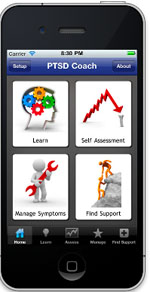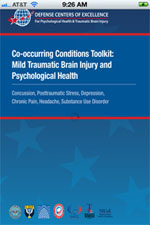Staff Voices - Got Apps?
Smart phones, they’re everywhere. In fact, currently there are approximately 91.4 million smartphones in the United States alone. Whether or not you have one and no matter your views on how good, bad or ugly smartphones are for society, statistically speaking the probability that your clients wear one like an extra appendage is very high. In fact, approximately 3 out of 5 clients aged 25 – 34 own a smartphone, which is more than any other age group. Oh, the wondrous things these clients can do with their smartphones from keeping a shopping list, to checking stocks, to updating their Facebook status, to tracking fitness, and yes… to managing their schedules with a reminder about their next appointment with you. How do clients do all this with their smartphones? Mostly through mobile applications or “apps” which are software programs designed to run on smartphones as well as tablet computers (e.g., iPad). Currently there are more than 500,000 apps for the Apple iPhone alone. And guess what, many of these apps are categorized as health and/or behavioral health tools.
So you as a healthcare provider are faced with a question: to app or not to app? While the decision is ultimately your own, I can suggest a few reasons why becoming a savvy, informed, app-accepting provider might improve your practice. First, clients are already using mobile apps. It is a platform that many are familiar with and seek out, especially Service members. Second, using apps can help to reduce stigma and potential barriers to care. From a logistics standpoint, the client has “hip pocket” availability to information and/or self-monitoring anytime, anyplace, 24/7, 365 days a year. Finally, being app-accepting does not mean you have to be proficient with using apps, you simply need to understand how to direct your clients to apps that have been developed by reliable institutions using evidence-based practice. You want to help them become “informed consumers” of apps in a sense. Apps can assist in the completion of homework assignments that include self-monitoring or the practice of a new skill. “The dog ate my tracking form” will be a thing of the past and with reduced paper-waste apps might even be environmentally friendly for your clinic or practice.
If we’ve piqued your interest or you’re already an early app-adopter, here is the skinny on a suite of apps that have been developed by the DoD’s National Center for Telehealth and Technology (T2). While this is not an exhaustive list of the behavioral health apps out of T2’s shop, it will serve as an introduction to some available offerings.
All the apps are free. Some are intended for the client’s use as a stand-alone, or as an adjunct to treatment. Others target you, the provider, by providing easily accessible, up to date reference guides to common conditions among service members. Remember, much of the information contained in these apps is material that you already know and utilize in practice! BUT, it is packaged in a way that might be more accessible or easier to use by you, or by the Service member/Veteran/Family member that you serve. So give it a try… get App Happy.
Listing of behavioral health apps from T2 (Images courtesy of National Center for Telehealth & Technology)
 PTSD Coach – This app was developed by T2 in collaboration with the VA's National Center for PTSD to assist Veterans and Active Duty personnel (and civilians) who are experiencing symptoms of PTSD. It is intended to be used as an adjunct to psychological treatment, but can also serve as a stand-alone education tool. Key features of the app include psychoeducation about trauma, PTSD and treatment, self-assessment of PTSD symptoms, the ability to track changes in symptoms over time, and introduction to self-help techniques to manage symptoms of PTSD such as systematic relaxation. In addition, this app provides assistance in finding immediate support by helping the user to identify personal sources of emotional support, populating the phone with those phone numbers, and providing link to treatment programs. In an emergency, users can quickly link to the National Suicide Prevention Hotline.
PTSD Coach – This app was developed by T2 in collaboration with the VA's National Center for PTSD to assist Veterans and Active Duty personnel (and civilians) who are experiencing symptoms of PTSD. It is intended to be used as an adjunct to psychological treatment, but can also serve as a stand-alone education tool. Key features of the app include psychoeducation about trauma, PTSD and treatment, self-assessment of PTSD symptoms, the ability to track changes in symptoms over time, and introduction to self-help techniques to manage symptoms of PTSD such as systematic relaxation. In addition, this app provides assistance in finding immediate support by helping the user to identify personal sources of emotional support, populating the phone with those phone numbers, and providing link to treatment programs. In an emergency, users can quickly link to the National Suicide Prevention Hotline.
mTBI Pocket Guide – The Mild Traumatic Brain Injury Pocket Guide app provides instant access to a comprehensive quick-reference guide on improving care for mTBI patients. Designed to reflect current clinical standards of care, the mTBI Pocket Guide mobile application can help providers improve quality of care and clinical outcomes for patients. Military and civilian physicians, physician assistants, nurse practitioners, and related treatment and therapy providers can use the application to find information on assessing, treating, and managing common symptoms of mTBI patients. The mTBI Pocket Guide mobile app offers clinicians a wide range of diagnostic, treatment and information resources including definitions, causes and severity ratings for mTBI, examples of clinical tools and resources, and examples of patient education materials.
 Breathe2Relax – is an app conceptualized as a portable stress management tool utilizing hands-on diaphragmatic breathing exercise. Breathe2Relax uses state-of-the-art graphics, animation, narration, and videos to deliver a sophisticated, immersive experience for the user. Features include customizable backgrounds and music, immersive tutorial videos, body scanner to display effects of stress, graphing to track effectiveness and audio narration.
Breathe2Relax – is an app conceptualized as a portable stress management tool utilizing hands-on diaphragmatic breathing exercise. Breathe2Relax uses state-of-the-art graphics, animation, narration, and videos to deliver a sophisticated, immersive experience for the user. Features include customizable backgrounds and music, immersive tutorial videos, body scanner to display effects of stress, graphing to track effectiveness and audio narration.
T2 Mood Tracker – This app provides user with easy way to self-monitor, track and reference emotional experiences over a period of days, weeks and months. The app allows the user to customize categories as needed, add notes, provides reminders for self-rating and graphs results which can be reviewed with a provider in session. An upcoming feature of this app includes the ability for a client to send the results to their provider as well.

Co-Occurring Conditions Toolkit (CCT) – Mild Traumatic Brain Injury (mTBI) presents a number of challenges to military healthcare professionals. Because symptoms of closed head wounds are often similar to those of a number of psychological conditions, assessing and treating patients presenting multiple conditions can be difficult.
The Co-occurring Conditions Toolkit (CCT) app is an electronic version of the familiar Co-occurring Conditions Toolkit published by the Defense Centers of Excellence (DCoE) for Psychological Health and Traumatic Brain Injury (mTBI). The new app includes the entire contents of the 132-page spiral-bound CCT, and adds enhancements such as interactive decision trees to aid in the identification of appropriate interventions and timing of services for this challenging patient population. Like the bound edition, the app incorporates VA/DoD Evidence-Based Clinical Practice Guidelines (CPGs) for the management of concussions and mTBI, together with CPGs targeting common co-occurring conditions such as post-traumatic stress disorder, depression, chronic opioid therapy, and substance use. As a mobile app, the new Toolkit offers primary care providers hip-pocket access to critical information and allows for seamless integration of new material, leading to improved quality of care, increased use of evidence-based treatment recommendations, enhanced provider-patient interactions, and more appropriate specialty referrals.
For additional information such as clinician guides on any of the apps highlighted in today’s blog as well as additional apps go to:http://www.t2health.org/mobile-apps
Smart phones, they’re everywhere. In fact, currently there are approximately 91.4 million smartphones in the United States alone. Whether or not you have one and no matter your views on how good, bad or ugly smartphones are for society, statistically speaking the probability that your clients wear one like an extra appendage is very high. In fact, approximately 3 out of 5 clients aged 25 – 34 own a smartphone, which is more than any other age group. Oh, the wondrous things these clients can do with their smartphones from keeping a shopping list, to checking stocks, to updating their Facebook status, to tracking fitness, and yes… to managing their schedules with a reminder about their next appointment with you. How do clients do all this with their smartphones? Mostly through mobile applications or “apps” which are software programs designed to run on smartphones as well as tablet computers (e.g., iPad). Currently there are more than 500,000 apps for the Apple iPhone alone. And guess what, many of these apps are categorized as health and/or behavioral health tools.
So you as a healthcare provider are faced with a question: to app or not to app? While the decision is ultimately your own, I can suggest a few reasons why becoming a savvy, informed, app-accepting provider might improve your practice. First, clients are already using mobile apps. It is a platform that many are familiar with and seek out, especially Service members. Second, using apps can help to reduce stigma and potential barriers to care. From a logistics standpoint, the client has “hip pocket” availability to information and/or self-monitoring anytime, anyplace, 24/7, 365 days a year. Finally, being app-accepting does not mean you have to be proficient with using apps, you simply need to understand how to direct your clients to apps that have been developed by reliable institutions using evidence-based practice. You want to help them become “informed consumers” of apps in a sense. Apps can assist in the completion of homework assignments that include self-monitoring or the practice of a new skill. “The dog ate my tracking form” will be a thing of the past and with reduced paper-waste apps might even be environmentally friendly for your clinic or practice.
If we’ve piqued your interest or you’re already an early app-adopter, here is the skinny on a suite of apps that have been developed by the DoD’s National Center for Telehealth and Technology (T2). While this is not an exhaustive list of the behavioral health apps out of T2’s shop, it will serve as an introduction to some available offerings.
All the apps are free. Some are intended for the client’s use as a stand-alone, or as an adjunct to treatment. Others target you, the provider, by providing easily accessible, up to date reference guides to common conditions among service members. Remember, much of the information contained in these apps is material that you already know and utilize in practice! BUT, it is packaged in a way that might be more accessible or easier to use by you, or by the Service member/Veteran/Family member that you serve. So give it a try… get App Happy.
Listing of behavioral health apps from T2 (Images courtesy of National Center for Telehealth & Technology)
 PTSD Coach – This app was developed by T2 in collaboration with the VA's National Center for PTSD to assist Veterans and Active Duty personnel (and civilians) who are experiencing symptoms of PTSD. It is intended to be used as an adjunct to psychological treatment, but can also serve as a stand-alone education tool. Key features of the app include psychoeducation about trauma, PTSD and treatment, self-assessment of PTSD symptoms, the ability to track changes in symptoms over time, and introduction to self-help techniques to manage symptoms of PTSD such as systematic relaxation. In addition, this app provides assistance in finding immediate support by helping the user to identify personal sources of emotional support, populating the phone with those phone numbers, and providing link to treatment programs. In an emergency, users can quickly link to the National Suicide Prevention Hotline.
PTSD Coach – This app was developed by T2 in collaboration with the VA's National Center for PTSD to assist Veterans and Active Duty personnel (and civilians) who are experiencing symptoms of PTSD. It is intended to be used as an adjunct to psychological treatment, but can also serve as a stand-alone education tool. Key features of the app include psychoeducation about trauma, PTSD and treatment, self-assessment of PTSD symptoms, the ability to track changes in symptoms over time, and introduction to self-help techniques to manage symptoms of PTSD such as systematic relaxation. In addition, this app provides assistance in finding immediate support by helping the user to identify personal sources of emotional support, populating the phone with those phone numbers, and providing link to treatment programs. In an emergency, users can quickly link to the National Suicide Prevention Hotline.
mTBI Pocket Guide – The Mild Traumatic Brain Injury Pocket Guide app provides instant access to a comprehensive quick-reference guide on improving care for mTBI patients. Designed to reflect current clinical standards of care, the mTBI Pocket Guide mobile application can help providers improve quality of care and clinical outcomes for patients. Military and civilian physicians, physician assistants, nurse practitioners, and related treatment and therapy providers can use the application to find information on assessing, treating, and managing common symptoms of mTBI patients. The mTBI Pocket Guide mobile app offers clinicians a wide range of diagnostic, treatment and information resources including definitions, causes and severity ratings for mTBI, examples of clinical tools and resources, and examples of patient education materials.
 Breathe2Relax – is an app conceptualized as a portable stress management tool utilizing hands-on diaphragmatic breathing exercise. Breathe2Relax uses state-of-the-art graphics, animation, narration, and videos to deliver a sophisticated, immersive experience for the user. Features include customizable backgrounds and music, immersive tutorial videos, body scanner to display effects of stress, graphing to track effectiveness and audio narration.
Breathe2Relax – is an app conceptualized as a portable stress management tool utilizing hands-on diaphragmatic breathing exercise. Breathe2Relax uses state-of-the-art graphics, animation, narration, and videos to deliver a sophisticated, immersive experience for the user. Features include customizable backgrounds and music, immersive tutorial videos, body scanner to display effects of stress, graphing to track effectiveness and audio narration.
T2 Mood Tracker – This app provides user with easy way to self-monitor, track and reference emotional experiences over a period of days, weeks and months. The app allows the user to customize categories as needed, add notes, provides reminders for self-rating and graphs results which can be reviewed with a provider in session. An upcoming feature of this app includes the ability for a client to send the results to their provider as well.

Co-Occurring Conditions Toolkit (CCT) – Mild Traumatic Brain Injury (mTBI) presents a number of challenges to military healthcare professionals. Because symptoms of closed head wounds are often similar to those of a number of psychological conditions, assessing and treating patients presenting multiple conditions can be difficult.
The Co-occurring Conditions Toolkit (CCT) app is an electronic version of the familiar Co-occurring Conditions Toolkit published by the Defense Centers of Excellence (DCoE) for Psychological Health and Traumatic Brain Injury (mTBI). The new app includes the entire contents of the 132-page spiral-bound CCT, and adds enhancements such as interactive decision trees to aid in the identification of appropriate interventions and timing of services for this challenging patient population. Like the bound edition, the app incorporates VA/DoD Evidence-Based Clinical Practice Guidelines (CPGs) for the management of concussions and mTBI, together with CPGs targeting common co-occurring conditions such as post-traumatic stress disorder, depression, chronic opioid therapy, and substance use. As a mobile app, the new Toolkit offers primary care providers hip-pocket access to critical information and allows for seamless integration of new material, leading to improved quality of care, increased use of evidence-based treatment recommendations, enhanced provider-patient interactions, and more appropriate specialty referrals.
For additional information such as clinician guides on any of the apps highlighted in today’s blog as well as additional apps go to:http://www.t2health.org/mobile-apps

